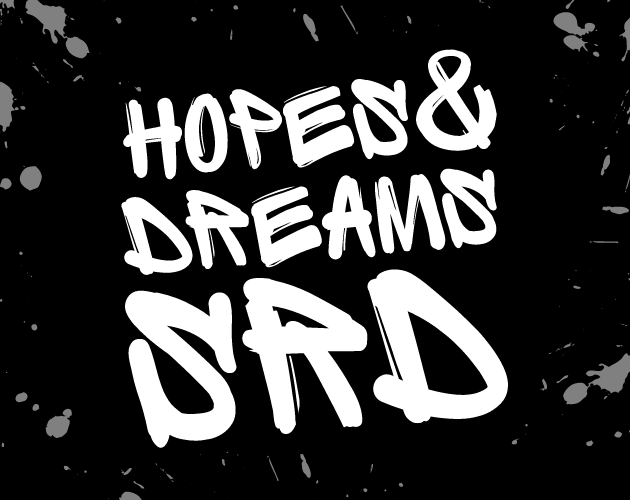This next section goes over how to customize and adapt the mechanics found in this document to help you design your own game Ignited by Hopes & Dreams.
Your Game
This is your project, so you can create, update, remove all the text and mechanics found in this document in any way you want. You just need to give us attribution for our work (see the Attribution Text section).
Content Warning
Take the time to include a content warning section that includes the themes present in your game. Being transparent will go a long way to ensure a safe playing experience for everyone at the table.
Your Setting
Explain the setting of your game, and what the story is mainly going to focus on. Touch on the sort of challenges the PCs will encounter, the factions that inhabit the world, and the places the player character might visit.
Your Checks
When making a check, the number of dice in the player’s pool or GM’s pool is determined via aspects affecting the action, positively or negatively.
Which aspects from the character’s kit affects a PC’s action? What happens when a PC burns hope? Are there other things apart from hindrances which can increase the risk of the GM’s pool?
Your Hopes
To help players get more narrative control in crucial moments, the system offers them this meta currency when a roll succeeds. They can then decide when is the best moment to burn it, and even the odds when things seem hopeless.
How should this be named in your game? Do you only get hope on successes? Can you spend it to clear a hindrance? Do you need hope to help someone? Are there other ways to get it back?
Your Hindrances
This system tracks character related negating aspects through hindrances. If they apply to the fiction surrounding a particular check, hindrances are used by the GM as a tool to increase the risk of a roll.
What kind of hindrances are there? (physical harm, mental harm, reputation, resources, etc.)?
For each type of hindrance, ask yourself:
What prompts this hindrance to happen? How do you clear it off? Does it affect more than just the risk of a check?
Your Plot Tracks
The game has different plot tracks that help organizes its gameplay. When completed, there’s a cinematic conclusion happening in the story that changes the world or the scene.
For your game, think about the different short-term elements that you want the group to focus on, and add plot track either at the character, group or world (GM) level.
Then, for each track, ask yourself:
What makes this track progress? What happens when it is filled (new aspect, new ability, new danger, etc.)? Can boxes in this track be unmarked?
Designing Kits
The core of this system relies on its kits. Those act kind of as playbooks, and highlight the types of characters the players will portray, and also goes over which aspects, and abilities makes them unique and special.
Your Kit’s Aspects
Every kit comes with a set of aspects that is unique to them. At the beginning of a game, characters usually have access to 3, but might be able to get more as the game processes.
What are this kit’s unique aspects (skills, knowledge, inventory, allies, etc.)? How many does the player have access to character creation? How to they get new ones?
Your Kit’s Abilities
Each kit has four abilities which players can use when tackling problems in the fiction. Usually, abilities don’t affect the odds of success. They instead provide new narrative liberties, boost the impact, or reduce the cost of a roll.
How many abilities does each kit have? How many abilities does a player have access to when creating their character? How can one unlock new abilities?
When making an ability, ask yourself:
What is the name of the ability? Does it allow for something new to happen in the fiction? Does it give a boost on a check’s impact? Does it reduce the cost of a check? Does it do both? Is there a cost to activate it? (hope, hindrances, etc.)
E.g.
- Now You See Me:: When surrounded, drop a smoke bomb and traverse unnoticed to a new location.
- This Won't Hold Me: When you hit an object in the hope of breaking it, get -1 cost.
- In and Out: When entering a restricted area alone, get +1 impact on a check.
Other Guidelines
Start with the setting. Try to find inspiration from things you love. Something like a movie, a TV series or a book.
Once you’ve found a piece a media that gets the inspiration flowing, mix it with a second one to create a unique combo. From there, work on adding things from your imagination to create something nobody has ever seen before.
Think about the core gameplay loop that the players will experience when playing the game.
Every mechanical aspect of your game should reinforce this loop, and the setting. If it doesn’t, take a moment to see if the mechanic is required at all, or find a way to tie it back to the game in a rewarding way.
Remember, less is more.
This SRD is written very briefly to give you a lot of design room. Rephrase or expand as you see fit to make this game your own.
Extra Mechanics
Hopes & Dreams comes with a set of mechanics that handles numerous aspects of gameplay. Don’t hesitate to get rid of the stuff that doesn’t apply to your game, then add mechanics that you think will reinforce your world. Add only what is necessary, and try to tie it with the core dice mechanic to keep things homogeneous.


